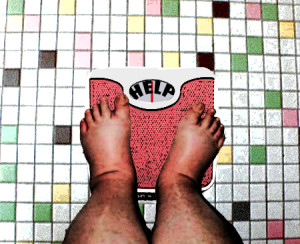This article was reposted from BlackandBrownNews.com
(Video) Fat. Just Fat: 5 Basic Tips to Lose Weight
One of the most miserable state of being—is being fat. The constant tugging at clothes that shift out of place; the closet filled with attire that we hope will soon fit; the frantic routine of changing into different outfits until we find one that…works; and of course, the abject despair when the number on the scale does not budge, or worse, moves further to the right. And yet the desire to be thinner and healthier persists, sometimes this unfulfilled hope can lead to self-loathing and low self esteem.
Photo Art by Jason Herdigein
The people who say that they are happy being “big”, i.e. Mama June, are not being honest with the world or, are in the minority when it comes to feelings about obesity.
One in every three Americans is overweight (BMI 25-29.9) or obese (BMI over 30).
How did this happen? It’s simple:
How we live has changed. We do our banking online instead of standing in line; we get our breakfast from Dunkin’ Donuts instead of at home; we drive, instead of walk; we play with iPhones instead of tag and tennis. We don’t move our bodies. Interestingly, of all the sedentary behaviors associated with weight gain, prolonged television watching is most associated with weight gain and most associated with the risk of becoming diabetic, more so than sitting at work.
We also sleep less. One third of all Americans get less than seven hours of sleep per night. Studies have shown that sleep deprivation changes the hormone levels that control hunger, leading to increased appetite, especially for high carbohydrate foods. And, sleep deprivation makes the body less responsive to diets that aim to limit caloric intake.
We have overweight/obese friends and family. The risk of becoming obese is increased by 57 per cent if your social circle includes an obese friend, 40 per cent if it includes an obese sibling and 37 per cent if you have an obese spouse. Note also that he effect of the weight of the members in one’s social circle does not diminish or change based on social class. Your fat friend may encourage you to eat the kind and amount of food that will make you gain weight!
By now it is well understood those who are obese are more likely to become diagnosed with a chronic illness or a terminal disease: heart disease, respiratory disease and cancer (breast, prostate and colon).
Note also, people who are obese are harder to care for and are at higher risk of medical complications. Pregnant women who are obese are twice as likely to deliver by c-section. In emergent situations, obese patients are harder to intubate (breathing tube placement) and when they need surgery they are more likely to develop post-operative complications, including pneumonia and wound breakdown. Further, those who are overweight will die three years earlier than those who are not. Those who are obese will forfeit seven years of life. (And those who are obese and who also smoke will sacrifice fourteen years of life.)
The AMA has adopted a new policy whereby obesity is now considered a disease. By categorizing obesity as a disease, the AMA hopes to spur insurance companies to provide more coverage for medications, surgery and counseling.
In a June article published in the New York Times, Dr. Patrice A. Harris said, “Recognizing obesity as a disease will help change the way the medical community tackles this complex issue that affects approximately one in three Americans.” Dr. Harris is the Chair of the Council on Legislation for the American Medical Association (AMA).
Dr. Patrice Harris said the obesity definition would help in the fight against heart disease.
But many physicians disagree with this tactic (myself included), in that categorizing obesity as a disease, may lead to more fervent dependence on medications and surgery as a remedy. Another argument is that obesity is a disease, in the same way that lung cancer is a disease caused by smoking. Both sides would agree, however, that weight maintenance/loss is challenging.Losing weight is hard.
Many of us—overweight and obese people (myself included)—suffer from the False Hope Syndrome…we start out fast and furious, falter and then fail.
Translation: I want to lose forty pounds now, not five pounds at a time. I’ll do it in time for my high school reunion next month. And, I will do it on my own, sheer will power is all I need, no need for counting calories and signing up for expensive programs. Once I’m skinny, the man/woman of my dreams will appear and I will win the lottery.
Losing weight is also simple.
Lifestyle intervention (diet, exercise and behavioral modification) is the most important strategy in weight loss.
1. Write it down, folks! Self monitoring–the use of food diaries and activity records has been shown over and over to result is short term weight loss and long term maintenance of weight loss.
2. Eat more often — A five meal a day pattern is associated with a significantly lower risk of becoming overweight and obese. Moreover, eating breakfast is associated with less weight
3. Stimulus control — Place healthier options in close proximity, prepare easy to eat low calorie foods, use smaller containers, plan ahead to have fresh fruit and vegetables in the refrigerator and do not eat mindlessly (don’t eat while watching television or reading.
4. Increase physical activity.
5. Set realistic goals.
Good Luck!
 Juliet M Nevins is a board certified obstetrician/gynecologist, a medical director at Aetna and the author of belowthebellybutton.com
Juliet M Nevins is a board certified obstetrician/gynecologist, a medical director at Aetna and the author of belowthebellybutton.com
